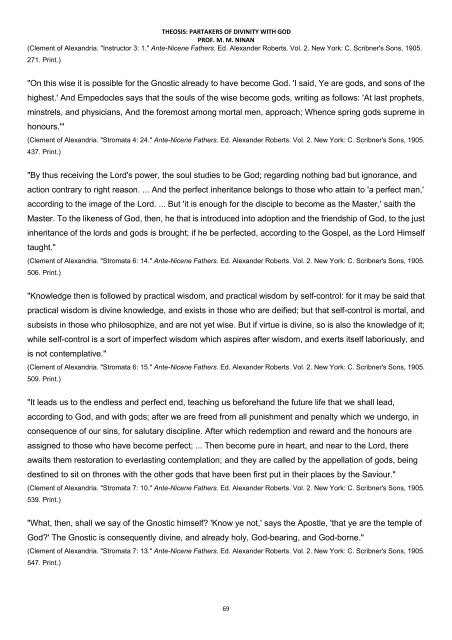Theosis
Create successful ePaper yourself
Turn your PDF publications into a flip-book with our unique Google optimized e-Paper software.
THEOSIS: PARTAKERS OF DIVINITY WITH GOD<br />
PROF. M. M. NINAN<br />
(Clement of Alexandria. "Instructor 3: 1." Ante-Nicene Fathers. Ed. Alexander Roberts. Vol. 2. New York: C. Scribner's Sons, 1905.<br />
271. Print.)<br />
"On this wise it is possible for the Gnostic already to have become God. 'I said, Ye are gods, and sons of the<br />
highest.' And Empedocles says that the souls of the wise become gods, writing as follows: 'At last prophets,<br />
minstrels, and physicians, And the foremost among mortal men, approach; Whence spring gods supreme in<br />
honours.'"<br />
(Clement of Alexandria. "Stromata 4: 24." Ante-Nicene Fathers. Ed. Alexander Roberts. Vol. 2. New York: C. Scribner's Sons, 1905.<br />
437. Print.)<br />
"By thus receiving the Lord's power, the soul studies to be God; regarding nothing bad but ignorance, and<br />
action contrary to right reason. ... And the perfect inheritance belongs to those who attain to 'a perfect man,'<br />
according to the image of the Lord. ... But 'it is enough for the disciple to become as the Master,' saith the<br />
Master. To the likeness of God, then, he that is introduced into adoption and the friendship of God, to the just<br />
inheritance of the lords and gods is brought; if he be perfected, according to the Gospel, as the Lord Himself<br />
taught."<br />
(Clement of Alexandria. "Stromata 6: 14." Ante-Nicene Fathers. Ed. Alexander Roberts. Vol. 2. New York: C. Scribner's Sons, 1905.<br />
506. Print.)<br />
"Knowledge then is followed by practical wisdom, and practical wisdom by self-control: for it may be said that<br />
practical wisdom is divine knowledge, and exists in those who are deified; but that self-control is mortal, and<br />
subsists in those who philosophize, and are not yet wise. But if virtue is divine, so is also the knowledge of it;<br />
while self-control is a sort of imperfect wisdom which aspires after wisdom, and exerts itself laboriously, and<br />
is not contemplative."<br />
(Clement of Alexandria. "Stromata 6: 15." Ante-Nicene Fathers. Ed. Alexander Roberts. Vol. 2. New York: C. Scribner's Sons, 1905.<br />
509. Print.)<br />
"It leads us to the endless and perfect end, teaching us beforehand the future life that we shall lead,<br />
according to God, and with gods; after we are freed from all punishment and penalty which we undergo, in<br />
consequence of our sins, for salutary discipline. After which redemption and reward and the honours are<br />
assigned to those who have become perfect; ... Then become pure in heart, and near to the Lord, there<br />
awaits them restoration to everlasting contemplation; and they are called by the appellation of gods, being<br />
destined to sit on thrones with the other gods that have been first put in their places by the Saviour."<br />
(Clement of Alexandria. "Stromata 7: 10." Ante-Nicene Fathers. Ed. Alexander Roberts. Vol. 2. New York: C. Scribner's Sons, 1905.<br />
539. Print.)<br />
"What, then, shall we say of the Gnostic himself? 'Know ye not,' says the Apostle, 'that ye are the temple of<br />
God?' The Gnostic is consequently divine, and already holy, God-bearing, and God-borne."<br />
(Clement of Alexandria. "Stromata 7: 13." Ante-Nicene Fathers. Ed. Alexander Roberts. Vol. 2. New York: C. Scribner's Sons, 1905.<br />
547. Print.)<br />
69

















